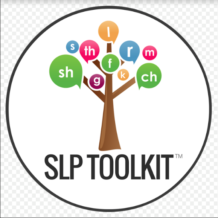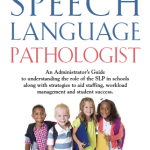Progress Monitoring Made Easy with SLP Toolkit

The School Speech Therapist would like to welcome guest bloggers Lisa Kathman, M.S. CCC-SLP & Sarah Bevier, M.S. CCC-SLP. I met Lisa and Sarah at the 2016 ASHA convention. Sarah gave me a quick demonstration of their product, SLP Toolkit and every aspect of it made sense. My initial impression was that it really could help school based SLPs. The following day I attended their formal presentation and continued to be impressed. For school SLPs the biggest drag is the copious amount of paperwork and vast amount of data we are suppose to collect. SLP Tool Kit has programs set up to take care of everything from goal writing to progress reports. They’ve set up ways to keep/measure data and have it organized for progress report writing. I’ve seen many a program over the years that is suppose to help with one thing or another but none with the universal potential of SLP Toolkit. I want every school based SLP to know about SLP Toolkit. Please take the time to check out this web based product. If you like it, don’t wait for your school to approve it. Sign up for a free trial or just get it for yourself. It might just make your life significantly easier. Teresa
Why does every school-based SLP dread the end of the grading period? It may have something to do with the 60 or so progress reports that go along with it (and the fact that you usually have to complete them over your vacation).
If you look at your current caseload, chances are that most of your goals are written in a format that uses SLP data as the criteria for measurement. So progress reports involve you pulling out your speech files, pouring through the session notes, doing some math, and hoping you have what you need to fill in the progress section on your report…because if not, you will be doing some last minute scrambling to collect data points or even worse, making “smart guesses” on progress.
The issue is not whether we collect data. We are speech-language pathologists! We not only are trained to take data and are good at it, but it is in our nature to love data. The problem is the the fact that the data we collect doesn’t necessarily align to how a goal is written. Let me explain further. The whole point of taking data in speech therapy is to make ongoing treatment decisions (e.g. What cues/intervention strategies worked best? What isn’t working? Is change occurring? What direction do I want to go in next time?) This is usually different data than what we need for a progress report, which is the performance on a skill in percentage format that you want a student to achieve within a year.
This is especially true for new IEPs when you may be working on underpinnings for the skill or related skills, but not the skill exactly as it is written in the IEP. Even when you think you are taking black and white data, for example for a skill like naming synonyms, there can be a wide variation in scores you record in your notes if there is no consideration in selection of stimulus items during therapy. For example, if one week you’re asking the student to name a synonym for the word “big” and the next week you’re asking for a synonym for the word “artificial”, scores look very different. No wonder panic and meltdowns happen at the time of writing progress reports.
This is where criterion referenced tests (CRTs) and rubrics can come to the rescue! CRTs measure a student’s performance against a predetermined criteria. Teachers frequently use CRTs to evaluate whether students have learned a skill or have met the expected academic standards. This form of measurement is also an excellent way for SLPs to collect baseline data on communication skills and then retest the student’s performance using the same criteria each quarter to monitor progress. The consistency of using the same CRT to retest improves accuracy of the data. The same set of stimulus items is used each grading period to determine progress on the skill.
As with any other assessment, it is important not to teach the items on the criterion referenced test. In treatment you are working on the strategies a student needs to acquire that skill in various contexts and then use the CRT at the end of the grading period to determine if those skills can be applied to the test.
Another effective way to measure progress on IEP goals is to use a rubric. Rubrics list a set criteria for mastery that include both quantitative and qualitative data in a way that makes sense to teachers and parents. They can include objective performance data on the skill, level of cueing needed, setting skill is used among other things, making it a more authentic measurement of the skill, with points assigned for each level of performance. Rubrics are particularly helpful for breaking down and assessing the complex nature of social skills, which can be complex and subjective. However, they are not limited to this communication area.
When using a rubric, it is important to attach the rubric to the student’s IEP so it is clear how the goal is being measured. Otherwise parents/teachers/unfamiliar readers may interpret a rubric score of 14/15 as a ratio rather than a total number of points to achieve.
If you would like to see some examples of CRTs and rubrics, SLP Toolkit has created a large bank with hundreds of speech/language CRTs and rubrics for a variety of communication skills. Sign up for a free trial at www.slptoolkit.com to access all content within the app for up to five students, including the progress monitoring tools.
For more information on criterion referenced tests and rubrics, check out our video tutorials on our Vimeo channel.
A little about Lisa and Sarah: Both hold master’s degrees in communication disorders from Arizona State University. Lisa has been an SLP for 20 years and is the lead SLP for Mesa Public Schools. She has presented on multiple topics in a variety of communication areas to general/special education teachers, directors, and students. Sarah has been in the field of speech pathology as an SLPA, speech technician and SLP for 10 years. Sarah has experience providing training to SLPs, school staff and university students on therapy topics and assessment.








One thing I forgot to mention is that the main reason I like this product is that it was created by 2 WORKING SLPs. Not researchers, paper pushers, computer whizzes, large companies, college PhD candidates or school administrators. Who else would know exactly what school SLPs need.
Thank you for your kind words and support Teresa! I love that you mentioned this. We are in the trenches so we know all too well the struggles and demands of school based SLPs! It is our mission to create a resource that will help to eliminate some of the burden so we can focus our attention where it matters the most!